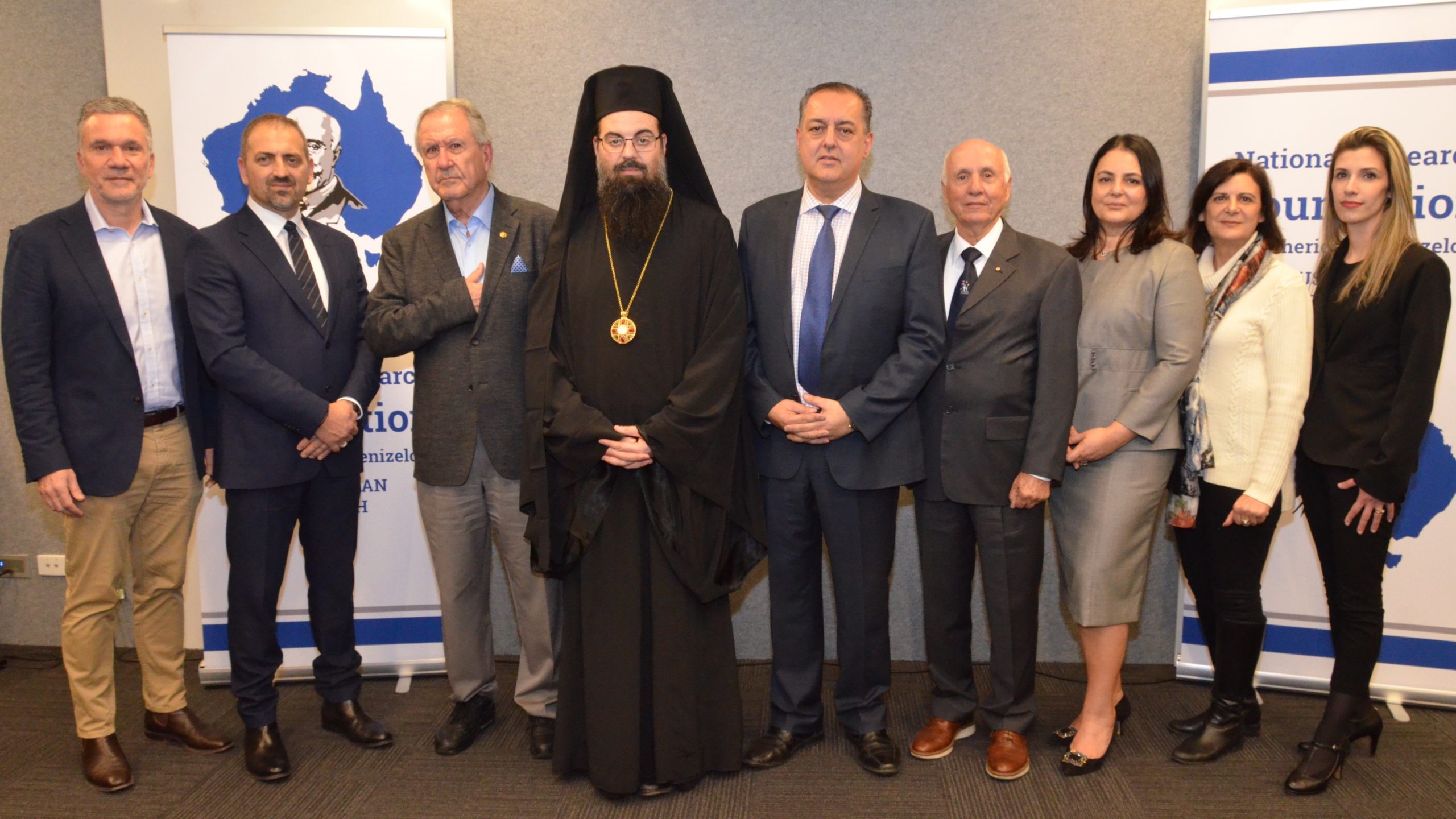With the full support of the Ministry of Foreign Affairs of Greece and the Greek Orthodox Archdiocese of Australia, a Chapter of the National Research Foundation ‘Eleftherios K. Venizelos’ was established in Melbourne.
It was the wish and goal of the National Foundation and its General Director, historian, writer and jurist, Nikolaos Papadakis-Papadis to operate in Australasia in general and in Oceania with its base in Melbourne – a chapter of it to preserve and promote the historical memory, but also the contribution of Ethnarch Eleftherios Venizelos.
Over 100 leaders of Hellenism, representatives of associations, communities, fraternities, academics, researchers, writers, and intellectuals gathered at the Lyceum Hall, Alphington Grammar, 18 Old Heidelberg Road, Alphington, last week.
The event was honoured from Greece with audiovisual messages by the Secretary General of Hellenes Abroad, Professor John Chrysoulakis on behalf of the Greek Government and the Ministry of Foreign Affairs of Greece and the Director General of the National Hellenic Research Foundation, Mr Papadakis.
On behalf of Archbishop Makarios of Australia, the esteemed assembly was welcomed by Bishop Evmenios of Kerasountos and the Consul General of Greece in the Northern Territory, John Anictomatis AO, while the Consul of Greece in New Zealand, Mr Neonakis, was also involved as member of the inaugural Board. Present at the Founding Assembly were, apart from Mr Anictomatis, the President of the Cretan Association of Sydney & New South Wales, Emmanuel Vitetzakis, from Sydney.
The establishment of the Melbourne-based branch of the National Research Foundation ‘Eleftherios K. Venizelos’ in Oceania is supported by the Ministry of Foreign Affairs of Greece, the Greek Orthodox Archdiocese of Australia, the Cretan Federation of Australia and New Zealand, the Greek Community of Melbourne and Victoria, the Hellenic Community of Western Australia, the Australian Institute of Macedonian Studies, the Australian Institute for Hellenic Research, the Greek-Australian Chamber of Commerce and Industry, the Cretan Association of Melbourne, the Australian Federation of Pontian Associations, the Cretan Association of New South Wales and the Pancretan Association of Melbourne.
This enthusiastic and impressive founding assembly which took place on Thursday, June 8, and which was distinguished for its impeccable organisation and professionalism of all those who had a role in the event, was opened by the ceremonial master and educator Natasa Spanos who, after honouring the First Residents and the fathers of Greek settlement in Australia, invited the Director of Alphington Grammar, Dr Vivian Nikou, to welcome the founding members of the Chapter.
Dr Nikou welcomed in Greek language and stressed that her school supports all the struggles of the Hellenic Diaspora for the preservation of the ethno-linguistic identity of Hellenism and welcomed the establishment of this new Panhellenic cultural action body. Dr Nikou then invited the attendees to recite, with the help of an orchestra, the National Anthems of Australia and Greece.
Ms Spanos then invited to the podium Bishop Evmenios who, as representative of Archbishop Makarios, stressed the seriousness of this new cultural venture, its importance as a spiritual bridge between Hellenism in metropolitan Greece and the Greek Diaspora, referred to the importance of the Chapter to highlight historical memory and promote knowledge of Greek, emphatically stressing that “without learning and using the Greek language, even Orthodoxy cannot be maintained.”
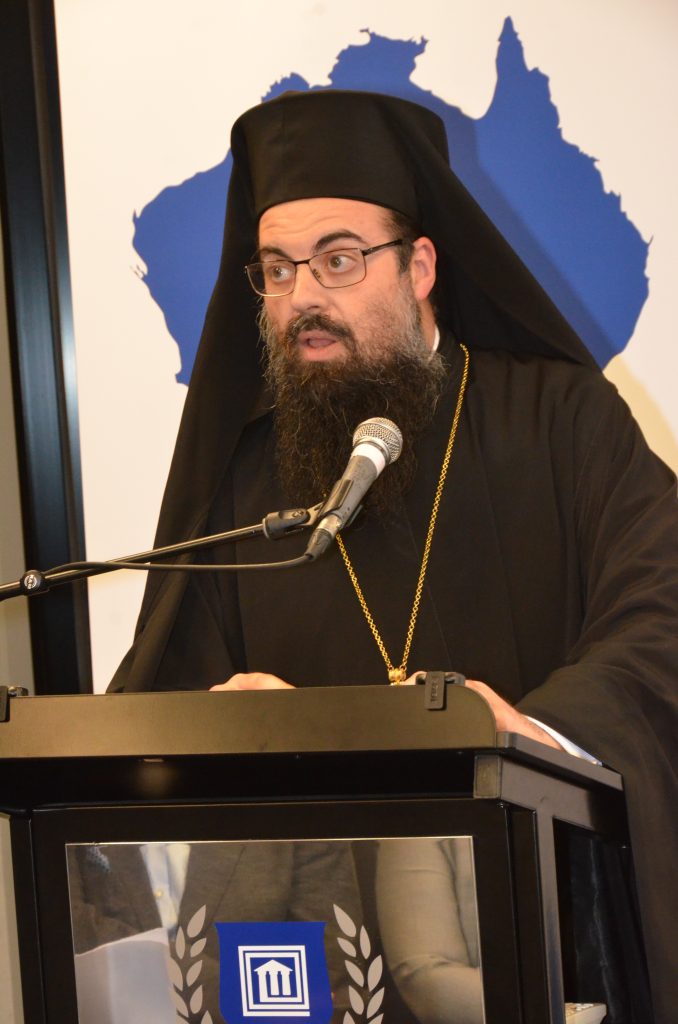
Bishop Evmenios called on the Greek Diaspora to be vigilant of the constant struggles for the preservation of our linguistic and religious identity and thanked all those who took the initiative to transplant the activities of the National Hellenic Research Foundation from Chania to Melbourne. For the record, Bishop Evmenios was the first to sign the Declaration of the Founding Assembly as a member of the Oceania Chapter.
The Consul General of Greece in Northern Australia Mr Anictomatis spoke next and thanked the organisers for the honour they gave him to include him in the founding members of the Chapter, referred to the importance of the Chapter in the wider promotion of Greece and Hellenism in Oceania and Australasia and called on Hellenism to support this cultural action.
“I am recruited to ally myself in this effort and I am committed without restrictions, ideological and personal rigidities to offer wherever and as much as I can,” Mr Anictomatis said.
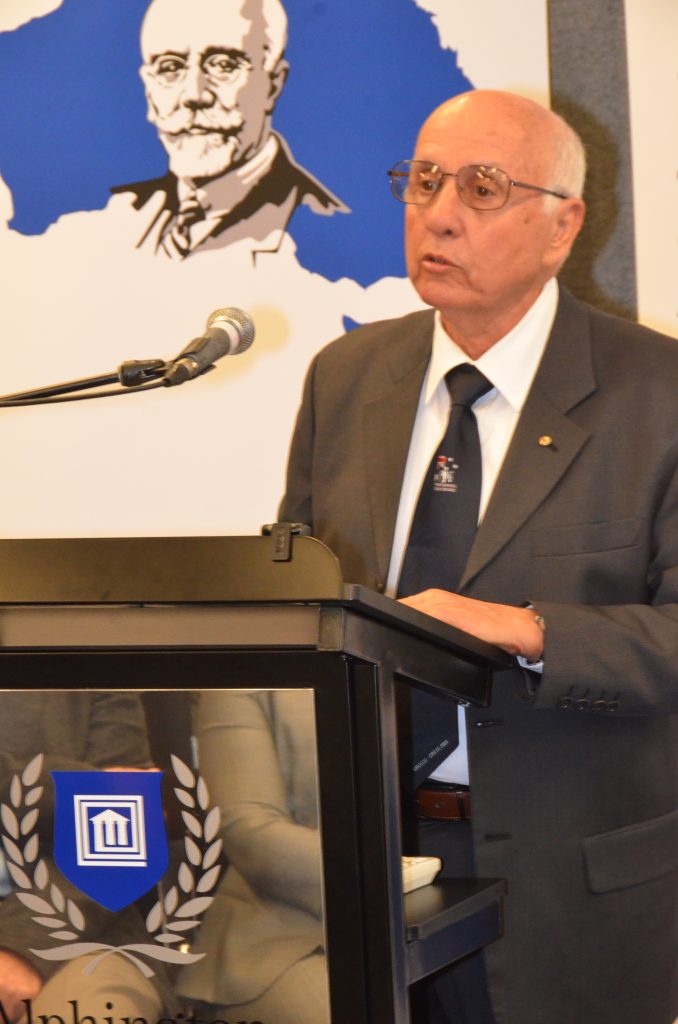
Then, the address of the Secretary General of Hellenes Abroad, Professor John Chrysoulakis, was projected on the screen, who greeted the attendees, referred to the importance for Greece and its national history of the establishment of a branch of the National Foundation “Eleftherios K. Venizelos” and stressed the research and academic work undertaken by these individuals who were called to serve on its Board of Directors.
“The Chapter will be particularly concerned with research and the study of issues concerning Venizelos and his Era, as they appear in Australian bibliography, in the archives of Australia and Britain, in the Greek-language newspapers of the time circulating in Sydney, Brisbane and Melbourne,” Chrysoulakis said.
“It will place particular emphasis on issues of wider and better awareness and will raise awareness among second and third generation Australian-Greeks, history students, Greek language teachers, students, and all those who wish to learn about the history of modern Greece.
“The Chapter will be a documentation and data and information search centre, as well as a reference centre on issues related to Venizelos and his Era. It will be able to convene conferences, invite international personalities, organise student competitions, publish, cultivate Greek-language literature, and encourage research and studies.”
This was followed by the greeting of the Director General of the National Research Foundation “Eleftherios K. Venizelos”, Mr Papadakis-Papadis from Chania.
“I am speaking to you from the Office of Eleftherios Venizelos,” the eminent writer and historian appeared on the screen greeting the members of the Founding Assembly.
Mr Papadakis initially proceeded to the history of the establishment of the National Foundation in 2000, in order to preserve historical memory and to teach the work and contribution of Ethnarch Venizelos, referred to the buildings and their contents in Chania that constitute a reference point in the history of Crete, to the man who seven times ruled Greece, stressed the research and academic activities of the National Foundation in Greece, referred to its branches in Athens and Thessaloniki, Serbia and the USA and stressed the importance of establishing and operating a branch in Oceania based in Melbourne, “the largest Greek-speaking city outside Greece.”
“The establishment of the Eleftherios Venizelos Chapter aims to strengthen Australian-Greek relations, to be a bridge of communication with Greek Hellenism, and to place particular emphasis on the study, study and dissemination of those values of freedom, democracy and inter-allied friendship that characterised the ethnarchical policy and vision of Eleftherios Venizelos,” Mr Papadakis said.
“The operation of the Branch will also aim to inform and create relations of friendship with our Australian fellow citizens, not only with Crete and the national vision of the most far-sighted and communicative Greek politician and nobleman of the 20th century, but also to become a shield of modern Greece in the current challenges.”
The President of the Cretan Federation of Australia and New Zealand, Tony Tsourdalakis, then took the floor and said: “The fundamental objective of the Branch is to cooperate closely with the National Foundation “Eleftherios Venizelos” in Greece, based on its existing Statute of Operation and to undertake programs and actions to be implemented, always in close cooperation with the officers of the National Foundation in Chania.”
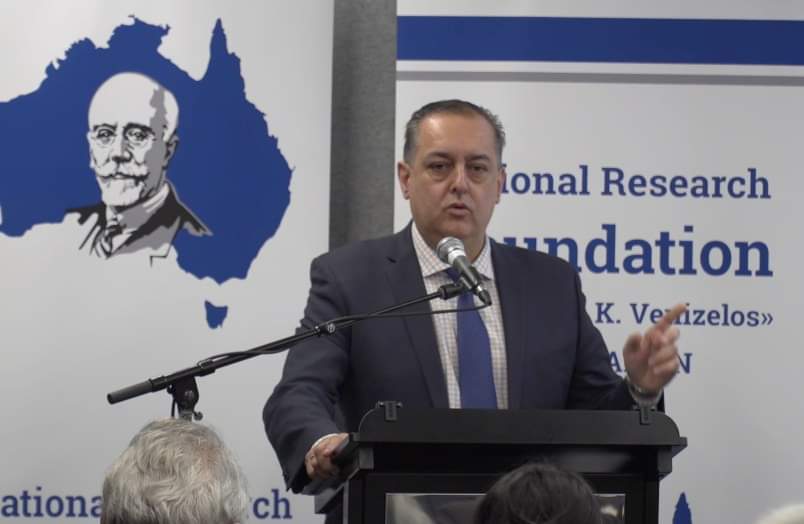
“The National Research Foundation “Eleftherios K. Venizelos” was established on March 26, 2000, and is based in the historic house of Eleftherios Venizelos in Halepa, Chania. The idea came from the Metropolitan of Kissamos and Selinos Irenaeus Galanakis. Through an effort of the society of Chania and Crete in general, which lasted many years, the vision to create a foundation in honour of the greatest Greek politician of the twentieth century became a reality,” Mr Tsourdalakis added.
“The main purpose of the National Foundation for Research and Studies “Eleftherios K. Venizelos” is to operate at national level, as a dynamic European research and educational centre and to be a central institution coordinating research and study of the work, era and life of the great politician and modern history of Greece without ideological commitments and rigidities.
“The Oceania Branch, the first branch of this level to be established in the third continent… will raise awareness among second and third generation Australian-Greeks, history students, Greek language teachers, students, and all those who wish to learn about the history of modern Greece.
“Through the Foundation’s Branch, we aim to promote on a Pan-Australian level the national vision of the most far-sighted and communicative Greek politician and nobleman of the 20th century, but also to strengthen relations between Greece and Australia so that this bond becomes a shield of modern Greece in the face of current challenges.”
The last speaker was Professor and President of the Australian Institute of Macedonian Studies, Dr Anastasios M. Tamis, who praised the contribution of Eleftherios Venizelos during the most turbulent period of Hellenism since the establishment of the modern Greek State, referred to the narcissism and indispensability of the Greek and his self-destructive rage, and invited the attendees to evaluate the difficult phases of Greek history, and especially the paradox of civil dissension with tolerance and leniency.
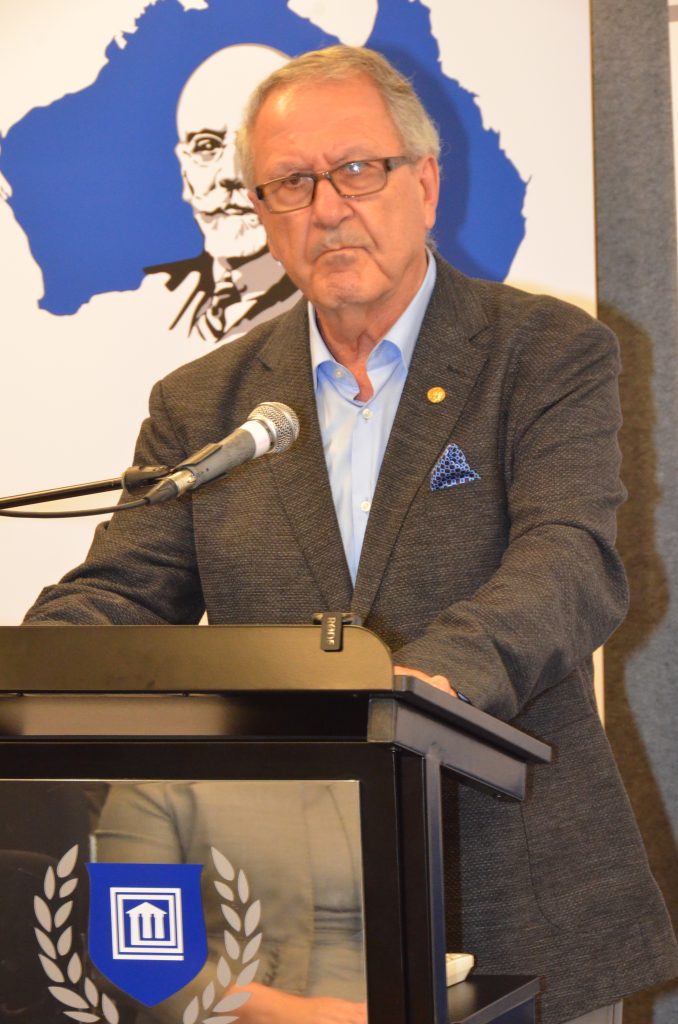
“We are unique in the world in the number of civil wars we fought from the 11th century BC to 1949 AD, but we are also unique in having a history of survival in the Diaspora from the 8th century BC to the present day,” Dr Tamis said.
“Eleftherios Venizelos was an ideology and a movement, a model of a sensitised Greek patriot, a pioneer of Greece in its irredentist struggles, a model of political science and an example to be imitated. History, which calmly evaluates and classifies, has placed him in the rank of Ethnarchos, the historical figure who is above political ideology, political factions, and party events. Venizelos belongs to all Greeks, of all factions and times, of all ideologies like Aristotle, like Kolokotronis, like Konstantinos Karamanlis.”
Pan-Australian Working Group:
The first Board of Directors approved by the National Foundation in Chania includes:
- Tony Tsourdalakis, as President of the Cretan Federation of Australia & New Zealand
- Christina Kotsifaki – Sarris as Director of the Company Pelagos.
- Aristea Konstantopoulou, as Academic & Accountant.
- Dr. Anastasios Tamis as Director of the Australian Institute of Hellenic Studies and President of the Australian Institute of Macedonian Studies.
- Dimitris Papadimitriou, Secretary of the Cretan Association of Melbourne.
- Dorothea Sarrisstavrou – Di Batista as Civil Engineer.
- Kostas Paterakis, as a Community producer of media programs.
- Polychronis Koutsakis from Western Australia, as Author and Professor at Murdoch University.
- Ioannis Anopentomatis from the Northern Territory as Consul General of Greece in Darwin.
- Dr Vrasidas Karalis from New South Wales as Head of Modern Greek at the University of Sydney.
- Emmanuel Vitetzakis as President of the Cretan Association of New South Wales.
- George Neonakis, as Honorary Consul of Greece in Wellington, New Zealand.
- Argyro Michelaki as President of the Pancretan Association of Melbourne.

